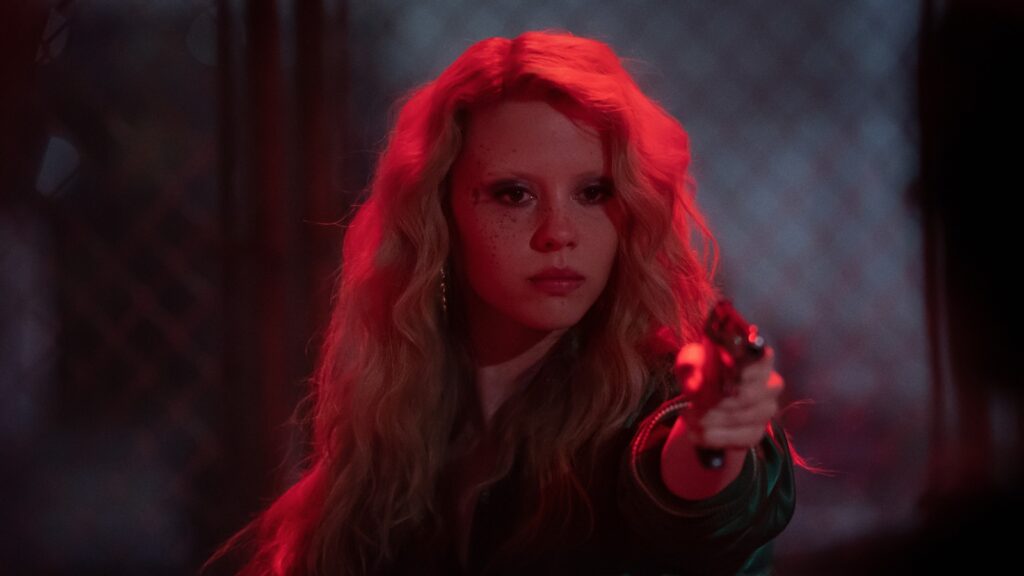
A sweaty and methodical build-up followed by a burst of spurting fluids—am I describing a horror movie, or a porno? The two genres collide in MaXXXine, though without the satisfactory release you might hope for. Sure, there is a bit of bare flesh on display and a good deal of blood, but surprisingly little in the way of tension or excitement. Sexploitation homages shouldn’t feel this neutered.
MaXXXine supplies enough visual style to make it watchable, but it’s still a disappointment, especially when you consider its genealogy. It’s the third consecutive collaboration between writer-director Ti West and actor Mia Goth, who two years ago gave us X, a snappy slasher that subtly interrogated the puritanical attitudes of the skin-flick ’70s while also delivering some humdinger set pieces. They followed that with Pearl, a cheeky prequel which excavated the origins of X’s geriatric villainess and provided Goth (who co-wrote it) with the monologue of a lifetime. MaXXXine flashes forward to the more recent past, bringing back Goth’s now-titular character from X along with a few tedious plot points. Set in 1985, the action has shifted from the clammy farmland of rural Texas to the glitzy neon of the Hollywood Hills, but the thematic preoccupations are similar to those of X. Once again, West is examining retrograde gender norms surrounding sex and cinema, imagining a lurid universe that blurs the line between on-screen indecency and real-world brutality.
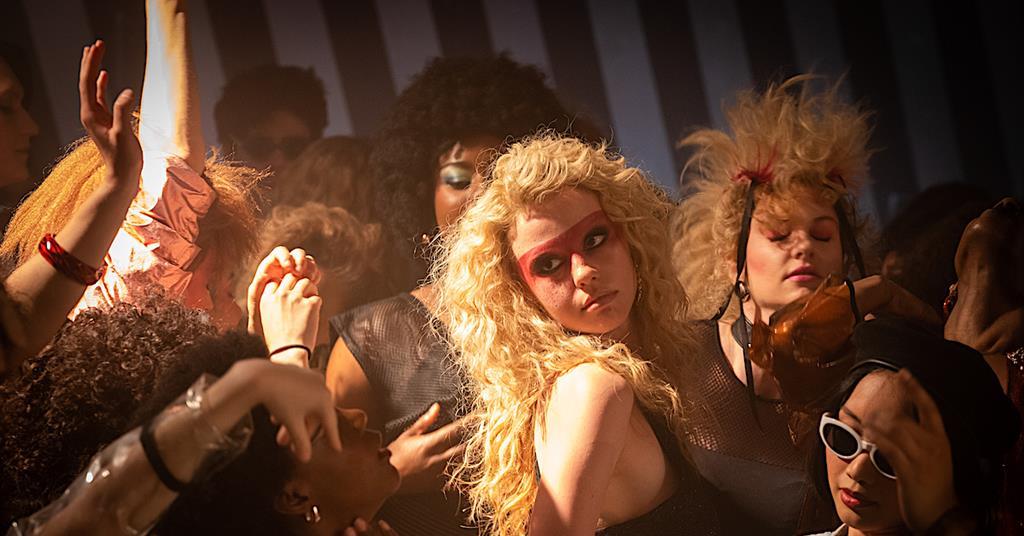
He is hardly the first filmmaker to cultivate such ambitions. One of the most divisive directors of the ’80s was Brian De Palma, who channeled his lifelong obsession with Alfred Hitchcock into seedy little thrillers like Body Double and Dressed to Kill. MaXXXine is essentially a tribute to those tributes, honoring the era that honored Hitchcock; not for nothing does one of its scare sequences take place in the house that, as the characters know all too well, was the shooting grounds for Psycho.
There is an undeniable frisson of cool to such a conceit, even as it shamelessly trades on viewers’ nostalgia. But the best elements of MaXXXine are conceptual—noteworthy more for their manipulation of Hollywood iconography than their independent energy. In one scene, the heroine flees a pursuer by darting through a studio back lot, meaning a Western-style standoff outside a faux saloon pivots into a cat-and-mouse chase at the Bates Motel; in another, she stalks a killer while clambering past the literal “Hollywood” sign. The ideas are fun. It’s the execution that’s desultory.
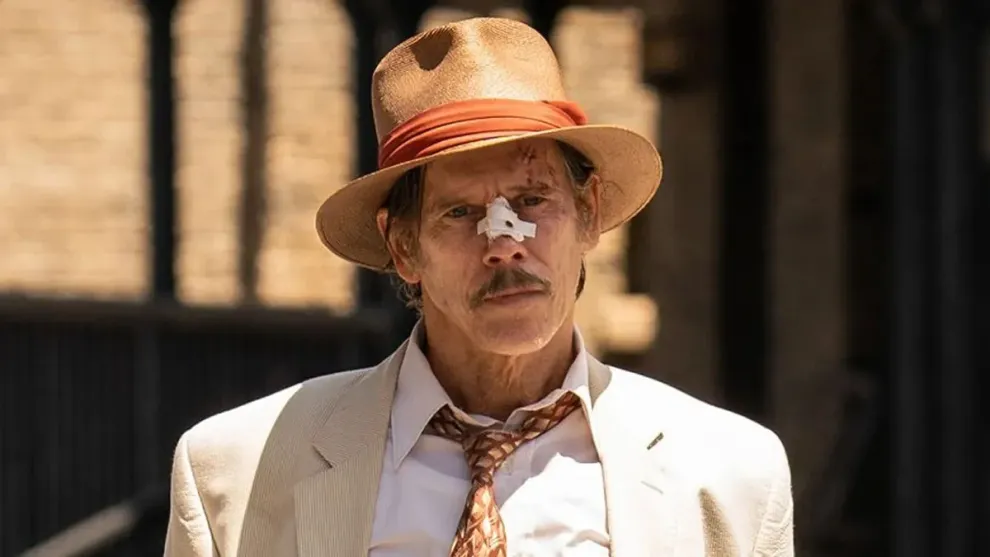
This doesn’t mean MaXXXine is devoid of flair or appeal. West’s choreography may be unusually lackluster, but he still loads the picture with eye-catching period images: buoyant hair, neon lighting, an unknown predator squeezing their black-gloved hands in clenched desire while staring into a peep-show booth. He also venerates that most sacred of obsolete cinematic artifacts, the video store; ratty VHS tapes factor into the movie’s silly plot, while a rental outlet houses one of its gruesome episodes of spattery violence.
Naturally, there is quite a lot of that. West sets MaXXXine against the backdrop of the Night Stalker murders, and the threat of death by random vivisection creates an air of panic among the city’s nocturnal street-walkers. Maxine, however, can handle herself; when a random creep follows her down a dark alley, he quickly discovers that he’s literally brought a knife to a gunfight, and his sadistic intentions end up costing him his genitals.
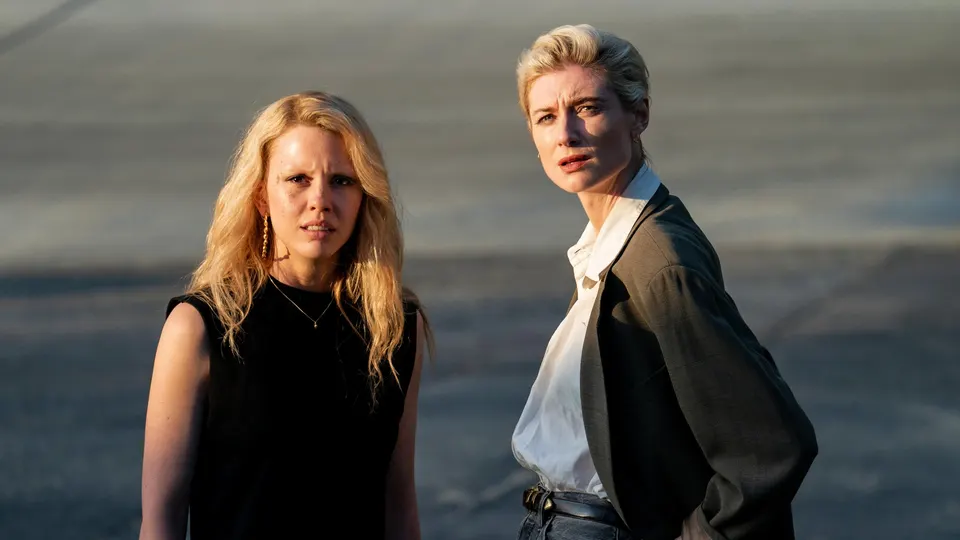
That’s pretty gross, but MaXXXine’s gore isn’t purely a matter of authorial excess. With a mixture of provocation and earnestness, West is considering how Hollywood’s horror factory holds up a mirror to a society festering with corruption, predation, and a rather different form of female possession. In the movie’s striking opening scene, Maxine, aiming to branch out from the adult-film industry into more mainstream fare, auditions for the leading role in The Puritan II, one of those grimy sequels that wields supernatural terror as an excuse to smear scream queens in blood—not to mention separate them from their clothing. (In a bit of wry humor, a producer applauds Maxine on her reading before asking, “Can you take your top off so we can see your breasts?”) The simulated mayhem she’s tasked to endure on the ensuing shoot has plenty in common with the actual carnage engulfing Tinseltown, especially once her close friends start turning up dead one by one.
Frankly, West explored these ideas with greater subtextual grace in X; here, when the director of The Puritan II (a wasted Elizabeth Debicki) delivers a blunt speech about the challenges facing women in the arts, she might as well be speaking directly to the camera. Still, Goth remains a magnetic presence; the scene where Maxine strolls out of her audition and saunters past a row of women in blond wigs, taunting them about their own futility (“Y’all might as well go home ’cause I just fucking nailed that!”), instantly reminds us of the actor’s dynamic swagger, which she later undercuts (but only slightly) with whispers of vulnerability. It’s easy to imagine a version of MaXXXine that leverages its leading lady’s charisma and draws you inside its heightened world.
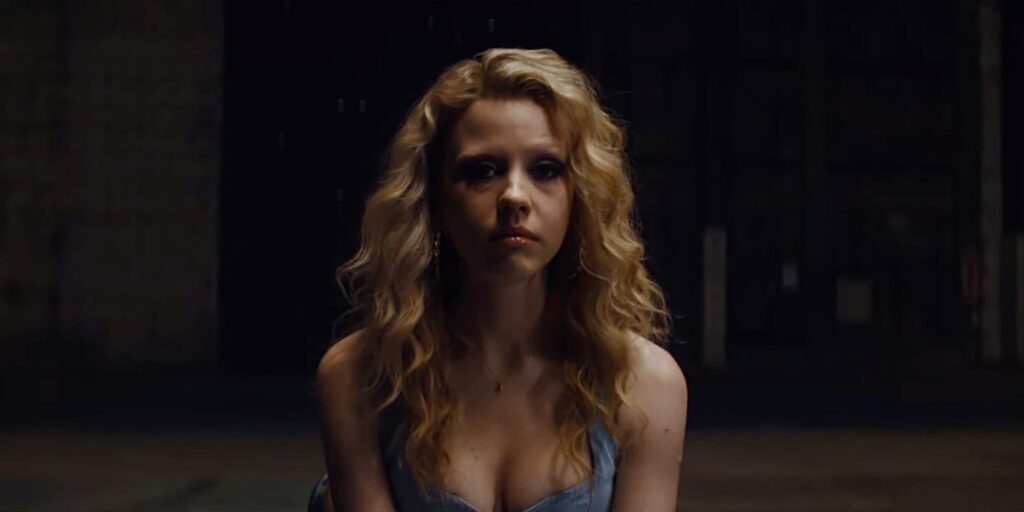
But that would require a greater level of panache than West proves able to summon. Honestly, it’s a little weird; the indie director previously demonstrated abiding patience and formidable technique in cult hits like The House of the Devil and The Innkeepers, and he only honed those gifts in X and Pearl. Yet the putatively thrilling sequences in MaXXXine are dreary and schlocky. A hectic shootout with a cult at a swimming pool, a deadly game of hide and seek in a nightclub bathroom, that climactic race in the shadow of L.A.’s most famous landmark—all unfold with a generic obviousness that fails to create any real suspense. Even the moment that threatens to develop some genuine dread—when Maxine is slathered in a grey plaster mold, blind and inherently prone to a surprise attack—fizzles into the usual cheap dream-scare.
The banality is frustrating, because we know from West and Goth’s prior work that this movie features plenty of talent on both sides of the camera. (Speaking of which, Kevin Bacon is on hand as a sleazy private dick; he at least enjoys himself, which is more than I can say for Michelle Monaghan and Bobby Cannavale as a pair of beleaguered gumshoes.) But where both X and Pearl brandished their genre DNA in a way that seemed fresh, MaXXXine feels largely secondhand, from its horror-by-numbers plot to its familiar violence to the decidedly underwhelming reveal of its killer. Maxine may harbor dreams of stardom, but if video stores were still around, the vehicle that bears her name would be destined for the discount aisle.
Grade: C+
Jeremy Beck is the editor-in-chief of MovieManifesto. He watches more movies and television than he probably should.
